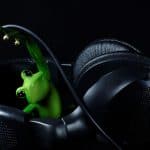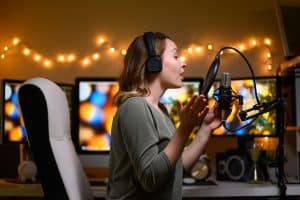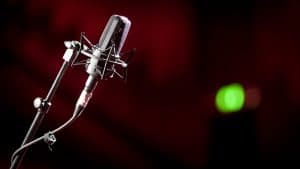
Some voice actors swear by using headphones while they record and others swear by going “naked” (no headphones). In this article, we’ll look at the main reasons why voice actors wear headphones so you can figure out if they’re a good fit for you.
Why do voice actors wear headphones? Voice actors wear headphones so they can monitor (hear) performance without their microphone also picking up sound from their speakers. Wearing headphones also allows voice actors to notice issues with the quality of their performance and the recording and adjust accordingly.
It turns out that quite a lot can go wrong during a recording session. Read on to learn about the specific problems voice actors face while recording and how wearing headphones can often help them avoid those issues (and submit completed recordings to their clients faster.)
To avoid audio problems during recording
Wearing headphones while recording lets voice actors hear any issues with the sounds being picked up by their microphone long before they switch to editing the recording.
During a recording session, other sounds can get picked up by the microphone. Things like:
- Mouth clicks
- Heavy breathing
- Thunder
- A stomach rumble
- Clothes rustling
- Sounds in the distance, like dog barking or a lawnmower
- A computer fan coming on
- (And way more)
It’s much easier (and faster) for a voice actor to deal with those issues while they’re recording than it is to do that during post-processing. Which also means they can do second, third and fourth takes while they’re set up to record.
Sidebar: For a voice actor to prepare to record a session could mean that they need to do any one (or all) of these:
- Moving into a different room
- Moving recording equipment around the room
- Picking a quiet time of day to record
- Picking the time of day when their voice sounds best, and so on.
After doing all that preparation to record a session, it would be frustrating to find out that the sound wasn’t “quite right” only when they sit down to edit the recording.
Wasting that valuable time could delay a voice actor in finishing a project by hours or even days. Especially if they don’t have a dedicated studio they can walk into and just hit “record”.
If a voice actor has recorded an entire session and then only noticed these issues later, they might have to re-record the whole thing. That’s both frustrating and can lead to stress if they’re working on a deadline.
I’ve actually had a similar experience before in recording simple “tutorial” videos for clients of a small business I owned. I would spend a half hour to an hour in the (quiet) early mornings recording only to find that most of my recording was a waste because I didn’t notice a background noise from my computer or some other noise in my environment.
And if you don’t have a dedicated, soundproofed room or studio to record in, that might mean waiting hours or days before you can do another take of the recording. Not fun.
To improve pronunciation, microphone technique and general self-awareness
Some voice actors wear headphones while they record their voice so that they can more easily pick up issues with their pronunciation. They’ll be able to hear subtle things in their voice that they might not otherwise notice but that affect the “feel” of a recording.
One personal example of that is that my voice has been a bit nasal lately. I didn’t really notice it but my nephews did when they came over for a visit. They asked if I was still sick from an infection I’d had earlier in the year.
If I was recording a voice session while my voice was sounding nasal, and I didn’t have headphones on, I’d probably end up wasting a recording session.
Also, using headphones, a voice actor will quickly be able to figure out if their “microphone technique” is good or not.
How many times have you cringed at the sound of your recorded voice being played back at you? Most of us have had that experience because the way we think we sound is completely different to what we really sound like.
By wearing headphones while recording, voice actors know exactly what they sound like because they’re hearing what the microphone is picking up. This can help a voice actor adjust their performance to better suit what’s needed for the gig. (And what’s best-suited for voice acting. Because the way you speak and the way you’ll perform in a gig are very different.)
To improve consistency between recording session
Voice actors will often need to record voice sessions some time apart. They could get called in again days, weeks or even months later to add parts or redo parts they’ve already recorded.
We’ve all had that jarring experience of hearing some audio (probably in a YouTube video) where you could clearly tell that part of the audio was recorded in a totally different session. Everything can sound different. The performer’s voice tone, the background noise, their tempo. Everything.
To avoid that kind of obvious disconnect in a recording, a voice actor might use headphones so that they can hear themselves which will let them more easily “copy” the original way they sounded in the earlier session.
Of course, there are other factors in making multiple recordings sound the same but being able to hear themselves will give them an instant feedback loop that they can use to adjust their performance “on the spot”.
Why do some voice actors not wear headphones?
This comes down to personal taste. Some voice actors swear by headphones so they can spot and fix issues while they record. Others swear by going “naked” (without headphones) so that the sounds they hear in the headphones don’t distract them from their performance.
Headphones are great for “quiet” recordings like narration, voiceover, podcasts and radio sessions. That also applies to quieter parts of an audiobook and any other kind of performance where the performers don’t need to “project” their voices or act much.
But if you’re recording an exciting role that requires some acting and “on the spot” performance? Then going “naked” might be your best choice. You might feel less “held back” in your performance and you’d certainly be less distracted by the sound of your own voice.
The most important factor that contributes to a good performance is to be comfortable. If you find it more comfortable to wear headphones than not, then do that. If you can’t stand the feeling of wearing headphones while performing, then don’t. Nothing will ruin your performance faster than being uncomfortable.
What type of headphones do voice actors wear?
A lot of voice actors use professional-quality closed-back (or circumaural) headphones because they cover your whole ear and so they prevent sound from leaking out of them (and being picked up your microphone.)
Some voice actors swear by professional in-ear monitors (which are different—and much more expensive—than the earbuds that came with your phone).
These are the same as what professional musicians will use in-studio and on-stage so that they can hear themselves. They don’t change the sound much so you can trust that what you’re hearing is what’s actually been recorded.
Another benefit to using in-ear monitors is comfort. I can’t stand having sweaty, clammy ears from wearing closed-back headphones for a long time. It’s gross and would definitely distract me from doing my best performance.
What type of headphones do voice actors avoid wearing?
The worst headphones you can use for monitoring are the earbuds that came with your phone. Typically, phone earbuds have awful bass response. You won’t hear just how much bass is in your performance which could lead to you recording a bass-heavy take that you’ll have to try and fix later in post-processing.
The second worst headphones you can use for monitoring are headphones with boosted bass. You might like the sound of that extra bass while listening to your favourite tracks but, again, it’s not what’s actually being recorded. So you might end up recording something a bit “tinny” because your headphones are adding so much bass.
Try and find something Goldilocks-y. Not too bassy and not too tinny. Use something “just right” in the middle. You’re looking for something with a “neutral” sound.


